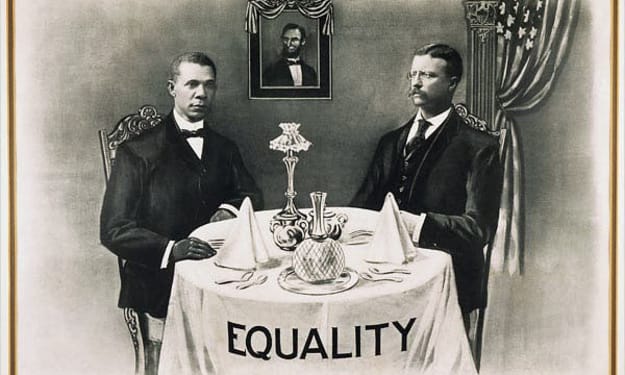You Would Probably Remember a Story Than a Statistic
The two kinds of statistics you need to know

This is true but there are some caveats, I think there are some people for whom data, statistics, theory, etc., do stick to their brains better than stories. It’s not as extreme as forgetting a story, rather preferential.
If I tell a story;
I went to the grand canyon to go bungee jumping, but they didn’t have bungee jumping so they shot me out of a cannon and I lived.
You’d probably remember this. This was made up by the way and didn’t happen but the way that memory works, you’ll probably think that it actually did.
If we are talking about the conveyance of information, I know people who are good with theory, data, and statistics, and so on. Because they are data people, they tend to dismiss stories as a form of evidence.
I have spent a lot of my life thinking about why storytelling is successful or at least useful.
Thinking about it from the evolutionary biology side, my theory is that stories are sticky because we needed to pass along information in the era before there was written language. So, you’ve got these massively long and complicated religious and mythic stories, and the bible, all of which existed pre-written language.
It’s hard to imagine that they were passed on orally but they were.
The bible is the most read book in the history of the universe and many people might agree that it contains among the most influential set of rules in human history which is the Ten Commandments.
We like to think that we remember things like rules and laws, but if you ask people to name the ten commandments, it’d be difficult.
There was a survey that found that 14% of US adults could recall the Ten Commandments which I thought was pretty good but only 71% could name even one commandment.
Best remembered were;
Thou shall not kill/murder,
Thou shall not steal, Thou shall not covet your neighbor's wife, the big prohibitions.
There are different versions. In the Jewish Bible, there are two versions which vary slightly, so some people remember it differently but the point is that this is the most famous set of rules in the history of the universe in what was probably the most read book in the history of the universe, and yet most people can maybe name one, or two, or three.
If you ask people who don’t come from a religious traditional background, they know the stories.
They’d probably know the story of Moses, Adam and Eve, Noah’s ark.
You might be thinking memories are bad. Maybe people don’t remember the ten commandments because their memories are not good.
In the same survey that found that people were so bad at recalling the ten commandments, it turns out that 25% of the respondents could name the seven principle ingredients of a Big Mac and 35% could name all six kids from the Brady Bunch, so human memory clearly has power.
Now, the Ten Commandments, of course, are not statistics but it calls to mind things like a government, teacher or an institution trying to tell people why they should do the right thing. There’s a ton of research that shows that telling people to do the right thing often doesn’t work but there’s also research that shows that telling them the rule itself is much less effective than telling them a story.
A Pentagon lawyer from the US Department of Defense named Stephen Epstein whose job was to brief different departments on the kind of things that their employees should and should not be doing, found that he would show employees the rules and regulations, and people would read it, and their eyes would glaze over so instead he created this book of true stories that he called the Encyclopaedia of Ethical Failure.
It was nothing but a catalog of epic screw-ups perpetrated by federal workers and his claim was that it was much more effective.
Debra Small, George Loewenstein, and Jeff Strnad contributed to a 2005 paper discussing the identifiable victim effect. In a nutshell, if you have a victim of crime or war and you talk about that one victim’s story(an identifiable victim), and who they were, and what happened to them, that could be much more compelling, and for example could get people to give more money to a cause than a statistic about millions of people(statistical victims).
I was reading this study in the Journal of Agriculture Safety and Health about trying to get farmers to use tractors in the appropriate way, what they found in this randomized control trial was that stories did better than informing farmers of what they ought to do or providing statistics about ways they could get injured and die.
I think we would agree that there is a lot of anecdotal evidence that storytelling is sticky.
Statistics are easy to remove ourselves from. A story, you are implicated in, and you have to choose what side you are going to be on.
-Patrisse Cullors
I was also reading a paper from the Journal of Experimental Psychology. It shows that jurors rely heavily on stories to decide their verdicts. Jurors confront masses of facts presented in a scrambled sequence which is disorienting with substantial gaps in their record filtered through the obvious personal biases of witnesses. It turns out they spontaneously construct a story to account for this welter of information, then match their personal stories with the stories told by the prosecution and defense and choose whichever side tells the story that best matches their own.
I believe that stories work because we are all narcissists to some degree and when we hear a story that has nothing to do with us; it could be the farmers in the aforementioned study looking into tractor safety or people on a jury, or popular stories from the Bible, we inherently insert ourselves in it to a certain degree.
The story appeals to the narcissist in all of us because as the cast of characters move through time and make decisions, we invariably put ourselves in their shoes and think, I would have done that, or I would have never made that decision.
This is why I think stories engage us in a way that statistics and data do not.
A neuroscientist Diana Tamir at Princeton conducted a study on what happens when we read fiction. She found that when you read a novel, you are better able to empathize and understand the feelings of other people.
There are other kinds of stories that are not about people like children's stories and most of these stories that have animals doing things are anthropomorphized and they also represent people, so we would still narcissistically imagine what we would do or wouldn’t do.
Stories are not just used to convey statistics or to
portray the news. It is used to transform values, lessons and of course
entertain us while consuming those. The goal is not necessarily a cognitive one
it is more an emotional one which makes the stickiness (or at least that is
what the current believe) Backing your story up with data and doubting it while
telling it might make it less sticky.
About the Creator
Blessing Akpan
I am a photographer of thoughts, let me capture your soul.






Comments
There are no comments for this story
Be the first to respond and start the conversation.